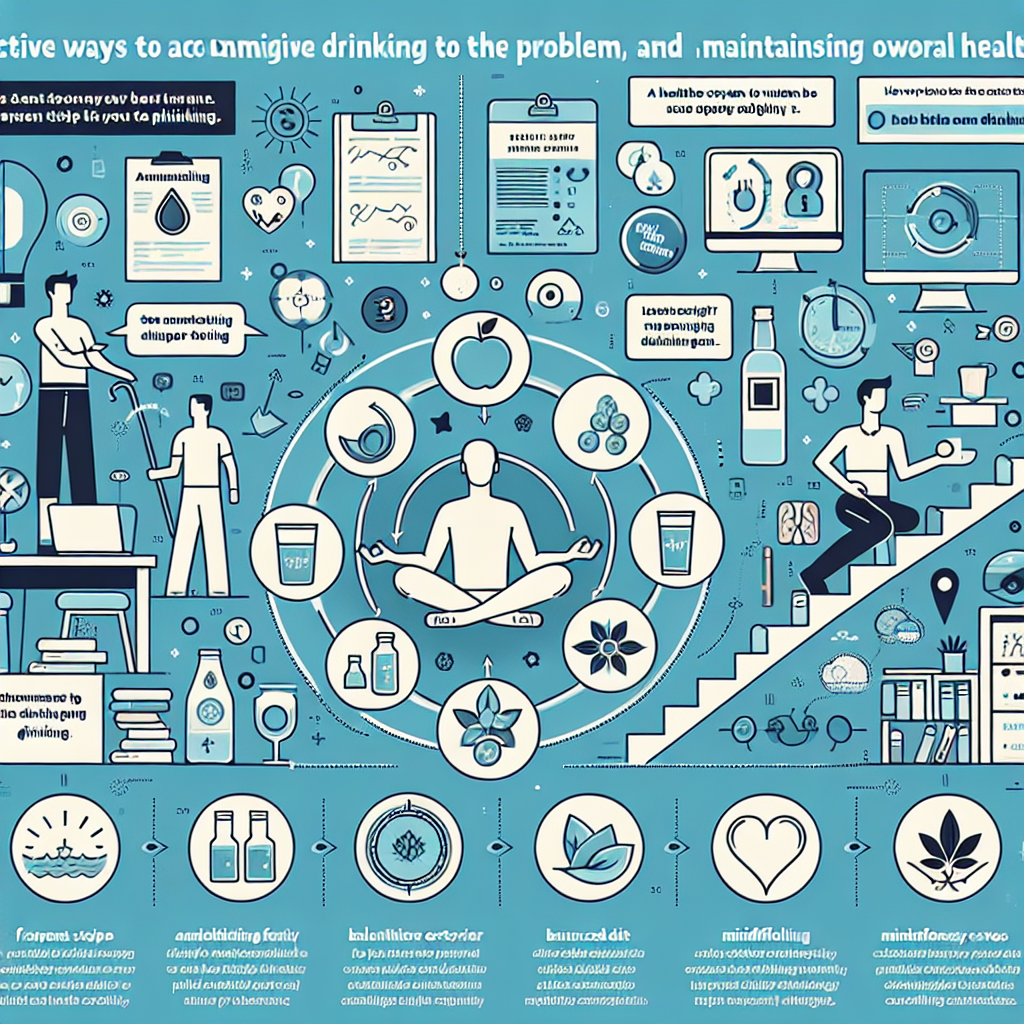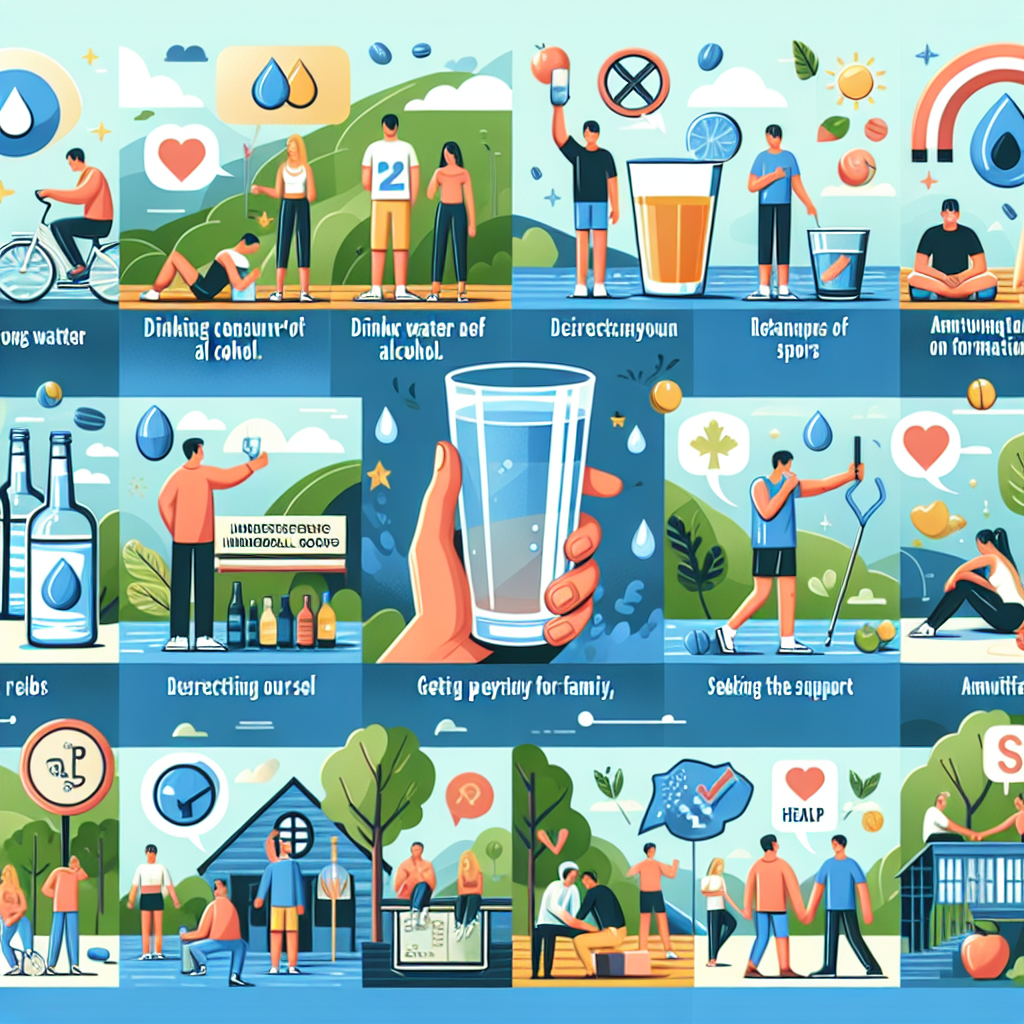-
Table of Contents

“Break Free, Live Well: Your Path to Sobriety and Healthier Living”
Introduction
Quitting alcohol can be a transformative journey that significantly enhances your overall well-being. There are several effective strategies to help you stop drinking and improve your health. These include setting clear goals, seeking support from friends, family, or support groups, and finding healthy alternatives to cope with stress. Additionally, engaging in regular physical activity, maintaining a balanced diet, and practicing mindfulness or meditation can aid in reducing cravings and promoting mental clarity. By adopting these methods, you can pave the way for a healthier, more fulfilling life free from the constraints of alcohol dependency.
Effective Strategies to Quit Drinking and Boost Your Well-being
Quitting drinking can be a transformative journey that significantly enhances your overall well-being. While the path to sobriety may seem daunting, adopting effective strategies can make the process more manageable and rewarding. One of the first steps in this journey is acknowledging the need for change and setting clear, achievable goals. By defining what you hope to accomplish, whether it’s improved health, better relationships, or enhanced mental clarity, you create a roadmap that guides your efforts and keeps you motivated.
Transitioning from contemplation to action often involves seeking support from others. Engaging with a supportive community, whether through friends, family, or support groups like Alcoholics Anonymous, can provide the encouragement and accountability needed to stay on track. Sharing your experiences and challenges with others who understand your struggle can be incredibly empowering and can help you feel less isolated in your journey.
In addition to social support, developing healthy coping mechanisms is crucial. Many people turn to alcohol as a way to manage stress, anxiety, or other emotional issues. Finding alternative ways to cope with these feelings can reduce the urge to drink. Exercise, for instance, is a powerful tool that not only improves physical health but also boosts mental well-being by releasing endorphins, the body’s natural mood lifters. Similarly, practices like meditation and mindfulness can help you stay present and manage stress more effectively.
Another important strategy is to identify and avoid triggers that may lead to drinking. This might involve making changes to your environment, such as removing alcohol from your home or avoiding social situations where drinking is prevalent. By creating a space that supports your sobriety, you reduce the temptation to revert to old habits. Additionally, finding new hobbies and interests can fill the void left by drinking and provide a sense of fulfillment and purpose.
Nutrition also plays a significant role in the journey to sobriety. Alcohol can deplete the body of essential nutrients, leading to various health issues. Focusing on a balanced diet rich in vitamins and minerals can help restore your body’s natural balance and improve your overall health. Hydration is equally important, as drinking plenty of water can help flush out toxins and keep your body functioning optimally.
Moreover, professional help can be invaluable for those struggling to quit drinking. Therapists and counselors specializing in addiction can offer personalized strategies and support tailored to your specific needs. Cognitive-behavioral therapy, for example, can help you understand the underlying thoughts and behaviors that contribute to your drinking and develop healthier ways to cope.
As you progress on your journey, it’s essential to celebrate your successes, no matter how small they may seem. Recognizing and rewarding your achievements can boost your confidence and reinforce your commitment to sobriety. Keeping a journal to track your progress can also be a helpful tool, allowing you to reflect on how far you’ve come and identify areas for continued growth.
In conclusion, quitting drinking is a multifaceted process that requires a combination of self-awareness, support, healthy coping mechanisms, and professional guidance. By taking proactive steps and embracing a holistic approach to well-being, you can overcome the challenges of addiction and enjoy a healthier, more fulfilling life. Remember, every step you take towards sobriety is a step towards a brighter future, and with determination and support, you can achieve lasting change.
Healthy Habits to Replace Alcohol and Enhance Your Life
Embarking on a journey to stop drinking and improve your health can be a transformative experience, filled with opportunities to adopt healthy habits that not only replace alcohol but also enhance your overall well-being. One of the most effective ways to begin this journey is by identifying the triggers that lead to drinking and finding healthier alternatives to cope with these situations. For instance, if stress is a major trigger, consider incorporating mindfulness practices such as meditation or yoga into your daily routine. These activities can help you manage stress more effectively, providing a sense of calm and balance without the need for alcohol.
In addition to mindfulness practices, physical exercise is another powerful tool in your arsenal. Regular physical activity not only boosts your mood by releasing endorphins but also improves your physical health, making you feel stronger and more energetic. Whether it’s a brisk walk in the park, a session at the gym, or a dance class, finding an exercise that you enjoy can make it easier to stick with it and reap the benefits. Moreover, exercise can serve as a healthy distraction, keeping your mind occupied and reducing the urge to drink.
Another important aspect of replacing alcohol with healthy habits is nutrition. A balanced diet rich in fruits, vegetables, lean proteins, and whole grains can have a profound impact on your physical and mental health. Proper nutrition helps stabilize your blood sugar levels, which can reduce cravings for alcohol and improve your mood. Additionally, staying hydrated by drinking plenty of water throughout the day can help flush out toxins from your body and keep you feeling refreshed and alert.
Social support is also crucial when making lifestyle changes. Surrounding yourself with supportive friends and family members who understand your goals can provide the encouragement and accountability you need to stay on track. Joining a support group or seeking professional counseling can also be beneficial, offering a safe space to share your experiences and learn from others who are on a similar journey. These connections can help you feel less isolated and more motivated to continue making positive changes.
Furthermore, finding new hobbies and interests can be an excellent way to fill the time that was once spent drinking. Engaging in activities that bring you joy and fulfillment can help you rediscover your passions and create a sense of purpose. Whether it’s painting, gardening, cooking, or learning a new language, exploring new interests can provide a healthy and enjoyable outlet for your energy and creativity.
It’s also important to practice self-compassion and patience throughout this process. Change doesn’t happen overnight, and there may be setbacks along the way. However, by acknowledging your progress and celebrating small victories, you can maintain a positive mindset and stay motivated. Remember that every step you take towards a healthier lifestyle is a step in the right direction.
In conclusion, replacing alcohol with healthy habits involves a multifaceted approach that includes mindfulness practices, physical exercise, proper nutrition, social support, and new hobbies. By integrating these elements into your daily life, you can not only stop drinking but also enhance your overall health and well-being. Embracing these changes with an open heart and a determined spirit can lead to a more fulfilling and vibrant life, free from the constraints of alcohol.
Q&A
1. **Question:** What are some effective strategies to stop drinking alcohol?
**Answer:** Effective strategies to stop drinking alcohol include seeking support from friends and family, joining a support group like Alcoholics Anonymous, setting clear goals and limits, avoiding triggers and high-risk situations, and seeking professional help from a therapist or counselor.
2. **Question:** How can stopping drinking improve your health?
**Answer:** Stopping drinking can improve your health by reducing the risk of liver disease, lowering blood pressure, improving mental health, enhancing sleep quality, boosting the immune system, and reducing the risk of certain cancers.
Conclusion
To stop drinking and improve your health, consider the following strategies: seek professional help through therapy or support groups, set clear and achievable goals, identify and avoid triggers, develop healthy coping mechanisms, engage in regular physical activity, maintain a balanced diet, build a strong support network, and practice mindfulness and stress-reduction techniques. Consistent effort and a commitment to these changes can lead to significant improvements in both physical and mental well-being.



